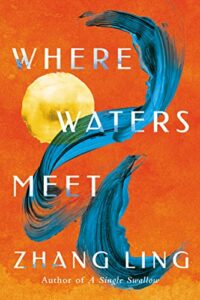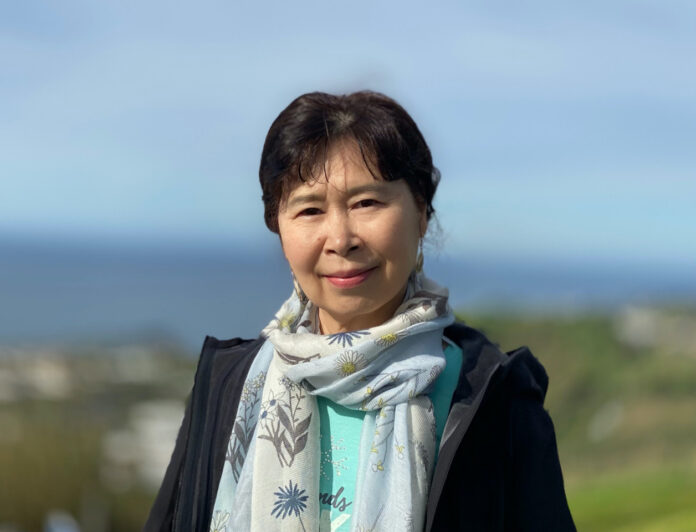Today, we’re getting personal with Zhang Ling, author of Where Waters Meet an emotional novel set in WWII Era Asia.
Hi Zhang, first, where are you from, where do you live? Is writing your full-time job?
I was born and raised in southern China and then moved to Canada in my late twenties to pursue further education. Before I came to settle in Toronto in 1994, I had lived in many different places. Becoming a writer has been my big dream ever since I was a little girl in China, even before I had learned enough words to compose a simple letter. This dream had traveled with me from city to city, job to job, waiting for a chance to see the light of day. Eventually, after working seventeen years as a clinical audiologist, I quit my job and started to write full time round 2010.
How long have you been writing?
I grew up during the Cultural Revolution in China, an age when a wrong opinion could lead to unimaginable consequences, so the idea of expressing myself through writing was out of the question. At sixteen, I started working, initially as a substitute teacher in a country school, then as a lathe operator in a factory. Then the tide started to turn and China began to open up. I was presented, all of a sudden, with an opportunity for higher education. The next two decades found me totally consumed by efforts to finish academic degrees and hunt for a job that could sustain my dream. It was not until the mid-90s that I was finally able to set aside some time for writing. Since then, I’ve published nine novels and several collections of novellas and short stories in Chinese.
What does your typical writing day look like?
If I am engaged in a big project, e.g. a novel, I’ll stick to a regular schedule as much as possible. Every morning (if I am lucky enough to have a good night’s sleep), I’ll get up around 8:30-9:00ish, rushing to my office with a cup of coffee, without even brushing my teeth, and start typing away – I feel most clear-headed and energetic in the morning. When the first burst of inspiration has run its course, “Mrs. Stinky” will clean up and have a brunch followed by a brief shut-eye afterwards. Then I’ll resume writing till dusk, which marks the end of my productive phase of the day. Very seldom do I carry my writing tasks into the evening hours, which I usually use for reading, enjoying a movie, a dinner with friends, or even a card game. I don’t like to exhaust the last drop of inspiration at one go. A little “leftover” will serve as the seed for the next day to ensure a good start.
Tell us about your latest release? Where the idea came from?
My latest release is a novel entitled Where Waters Meet, published in spring 2023 by Amazon Crossing. It’s my tenth novel, but the first written in English. The story is about a daughter’s journey of finding the truth about her mother’s mysterious past. What the daughter discovers is an extraordinary tale of courage and survival. The inspiration comes from my working experience as a clinical audiologist dealing with veterans and refugees from war-torn countries, as well as from the women from my mother’s family who have endured unspeakable suffering through the wars and social turmoil that transpire in the modern history of China. They remind me of water which moulds itself to the shape of the riverbed it flows into, however rough the terrain, silently adapting and sustaining. They are the female equivalents of Hemingway’s men who “can be destroyed but not defeated”.
Who has been the most difficult character for you to write? Why?
Probably the Japanese squad leader Kobayashi, a relatively minor but most challenging character. A part of the Japanese war machine, he commits unspeakable brutalities wherever he treads. But at the same time, he is a loving son of a hard-working peasant family. It’s easy to portray a beast, but when the beast is also a man capable of feelings and emotions common to humankind, it becomes a challenge to the writer. It consumes my intelligence and creativity trying to add complexity and depth to such a man/beast character.
What’s your take on research, and how do you do it?
Where Waters Meet covers a span of seven decades, involving the second Sino-Chinese War (1937-45), the Civil War (1946-49) which ends with the Communist victory in 1949 and starts an exodus to Hong Kong (1950s-70s), the Anti-Rightist Movement (1957), the great famine (1959-61), the Cultural Revolution (1966-76), and the Reform and Opening Up period which begins in late 1970s. To cover such an eventful period of time requires a considerable amount of library research and interviews of witnesses and survivors. I have conducted a fair amount of both over the past few years.
Are there any particular authors that have influenced how you write?
My reading history has been long and winding, and my taste changes from time to time. Of all the books I’ve read, a few have stood out in my memory. Gunter Grass’s Tin Drum, Garcia Marquez A Hundred Years of Solitude, Joseph Heller’s Catch 22, Salman Rushdie’s Midnight’s Children… The list goes on. These authors are known to explore the themes of war, turmoil and suffering, a topic I share in my writing. I am particularly impressed by their talent in describing grave subjects with irony, dark humor and a touch of magical realism. Their compassion for human suffering is powerfully expressed in a scathing and provocative sense of absurdity.
Do you have a secret talent readers would be surprised by?
I’d rather share a secret weakness which embarrasses me hugely in my social activities. I have a photographic memory for details of a conversation or an event, yet I am terrible with names and faces. A large social gathering such as a cocktail party without someone I trust by my side to cue me in would be the death of me. Over the time, I have developed a coping strategy which works quite well: When someone approaches me whose name I can’t recall, I’d feign a half-charming smile, and answer questions with a series of vague yeses followed by an occasional enigmatic no, just to bide my time until a familiar detail comes up in the conversation to save me from a total disaster.
What is the one question you never get asked during interviews, but wish you did?
I wish people would ask me how I learned English in China. The story of Ah-Feng (Phoenix) learning English in Where Waters Meet is partially based on my own experience. My first knowledge of English came from a program called English 900 broadcasted by Voice of America in the 1970s. For a few years I listened to VOA in secret, wrapping myself up in a quilt with the radio set held close to my ears to avoid sound leaking, as listening to the “enemy stations” was a severe crime in those days. My formal education in English began much later.
Wow, that is fascinating! Thank you so much for joining us today, Zhang.
Reader’s, here’s a look at WHERE WATERS MEET:
 A daughter discovers the dramatic history that shaped her mother’s secret life in an emotional and immersive novel by Zhang Ling, the bestselling author of A Single Swallow.
A daughter discovers the dramatic history that shaped her mother’s secret life in an emotional and immersive novel by Zhang Ling, the bestselling author of A Single Swallow.
There was rarely a time when Phoenix Yuan-Whyller’s mother, Rain, didn’t live with her. Even when Phoenix got married, Rain, who followed her from China to Toronto, came to share Phoenix’s life. Now at the age of eighty-three, Rain’s unexpected death ushers in a heartrending separation.
Struggling with the loss, Phoenix comes across her mother’s suitcase—a memory box Rain had brought from home. Inside, Phoenix finds two old photographs and a decorative bottle holding a crystallized powder. Her auntie Mei tells her these missing pieces of her mother’s early life can only be explained when they meet, and so, clutching her mother’s ashes, Phoenix boards a plane for China. What at first seems like a daughter’s quest to uncover a mother’s secrets becomes a startling journey of self-discovery.
Told across decades and continents, Zhang Ling’s exquisite novel is a tale of extraordinary courage and survival. It illuminates the resilience of humanity, the brutalities of life, the secrets we keep and those we share, and the driving forces it takes to survive.






